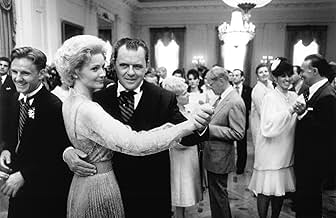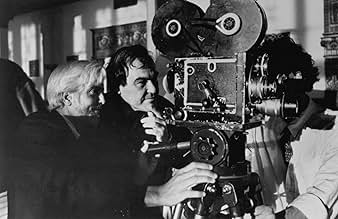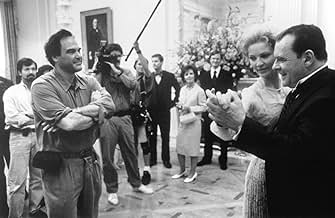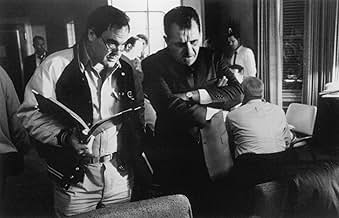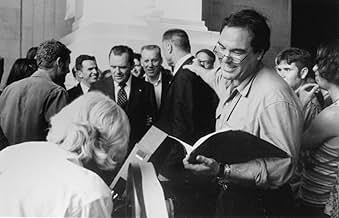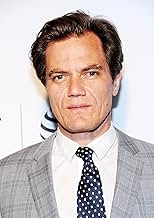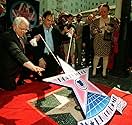A vida e trajectória política de Richard Nixon, desde a sua infância até à eleição para Presidente dos Estados Unidos da América, para dois mandatos e uma amarga queda em desgraça, após o es... Ler tudoA vida e trajectória política de Richard Nixon, desde a sua infância até à eleição para Presidente dos Estados Unidos da América, para dois mandatos e uma amarga queda em desgraça, após o escândalo Watergate e a sua renúncia ao cargo.A vida e trajectória política de Richard Nixon, desde a sua infância até à eleição para Presidente dos Estados Unidos da América, para dois mandatos e uma amarga queda em desgraça, após o escândalo Watergate e a sua renúncia ao cargo.
- Direção
- Roteiristas
- Artistas
- Indicado a 4 Oscars
- 11 vitórias e 18 indicações no total
- Direção
- Roteiristas
- Elenco e equipe completos
- Produção, bilheteria e muito mais no IMDbPro
Avaliações em destaque
Nixon is seen as a troubled figure, insecure and paranoid, with few friends. An unhappy childhood, in which he refers to himself as his mother's "faithful dog," in fact does dog him his whole life, as he seeks to please a demanding ultra-religious mother (Mary Steenburgen)who had already died by the time he took office as President, but whose memory and expectations lived on. Nixon is burdened with an unhappy marriage to Pat (Joan Allen) - unhappy largely because of his own obsession with political success - and haunted by the ghost of John Kennedy, who defeated him for the presidency in 1960 and who Nixon could never live up to. Kennedy was loved; Nixon was hated - he could never get over that. A scene near the end of the movie demonstrates his feelings toward JFK as he looks at Kennedy's White House portrait: "They look at you and see what they want to be; they look at me and see who they are."
Although the movie - as any review of Nixon's life will - revolves around Watergate, it provides a fascinating summary of his life, and of what added up to make him the troubled and lonely figure he really was. There's also typical Oliver Stone material as dark hints of conspiracy extending far beyond Watergate are inserted. Perhaps the most unsettling being a meeting Nixon has shortly before JFK's assassination with some supporters in Texas who are trying to convince him to run for the presidency again in 1964. Nixon protests that Kennedy can't be beaten in '64. A Cuban American present says ominously "What if Kennedy doesn't run in '64?"
A truly fascinating portrayal of a fascinating man, even in the end somewhat sympathetic to Nixon as the film ends with his 1994 funeral service, some comments at that service by President Clinton and a summary of his career by a narrator pointing out his accomplishments. A last note: kudos to Paul Sorvino, who hit Henry Kissinger bang on.
8/10
Oliver Stone's direction is nothing short of a miracle. As in his 1991 masterpiece, JFK, he has a lot of different characters to bring to life on the screen. He helps his actors fashion their performances with miraculous accuracy. Paul Sorvino is dead-on as Henry Kissinger, as is Joan Allen as Pat Nixon, and Bob Hoskins as the mysterious, mean-spirited J. Edgar Hoover.
The writing is also represents a triumph. Stone and co. are able to synthesize entire pages of historical prose into digestible chunks of dialogue. Aspiring screenwriters should seriously take note.
Although 1995 also saw the likes of Casino, Seven, Heat, and The Usual Suspects, Nixon is the ultimate champion. History on screen has rarely been this exhilarating.
Directed by Oliver Stone, it's not appropriate for people who don't know anything about Nixon, or Watergate, or this period of American history, since the film wasn't wasting time explaining anything. So if you didn't understand why Nixon opened the US to China or what was the Watergate or the Bay of Pigs, I suggest you ignore the movie for now and first go read some books or see some documentaries about it. Another problem I want to highlight is the huge web of conspiracies and obscure theories that the film weaves around the president. It never lets us understand what "crimes of responsibility" Nixon has committed. The film also suggests, without subtleties, that Nixon was a simple man who rose in life but wasn't accepted by the "American aristocracy" because of this humble origin, which left him deeply hurt. I don't know if it's true, but the film indicates that as origin of President's lack of scruples.
Anthony Hopkins assures the main role in an interesting performance, but that's far from being his best. He made a good preparation and tried his best to be Nixon, but has few physical similarities with him, not to mention his extreme difficulty in imitating president's characteristic voice. Anyway, Hopkins was brilliant at his character's psychological work, with most dramatic scenes going on as he, semi-drunk, reviews his decisions while listening to his famous audio tapes. The remaining cast does a reasonable supporting work. I will not close my review without left a word of appreciation to the sets and costumes, which rebuilt the atmosphere and culture of the Seventies quite well, much like the rooms and offices within White House. Not being exceptional, it's an elegant, quality film, that helps us think about an important period in American history.
Você sabia?
- CuriosidadesTo gain the feel of Richard Nixon, Anthony Hopkins watched on tape almost every speech Nixon ever made several times. He also met some people who knew Nixon and could lend Hopkins some insight on him.
- Erros de gravaçãoThe film shows Nixon signing his resignation letter the day before he leaves office and prior to it being publicly announced. Historically, Nixon informed the nation in an address the night before leaving office, and then signed the letter the next day, which was his last morning in the White House.
- Citações
Richard M. Nixon: [to a portrait of Kennedy] When they look at you, they see what they want to be. When they look at me, they see what they are.
- Cenas durante ou pós-créditosSecond opening credits: "For what is a man profited, if he shall gain the whole world, and lose his own soul?" Matthew 16:26.
- Versões alternativasLetterbox video version features additional outtake footage, including a scene starring Sam Waterston as CIA director Richard Helms.
- Trilhas sonorasMenuetto
from Schubert's "Symphony No. 2 in B Flat Major, D 125"
Written by Franz Schubert
Performed by Koninklijk Concertgebouworkest (as Royal Concertgebouw Orchestra)
Nikolaus Harnoncourt, Conductor
Courtesy of Teldec Classics International GmbH
By arrangement with Warner Special Products
Principais escolhas
- How long is Nixon?Fornecido pela Alexa
Detalhes
- Data de lançamento
- País de origem
- Idiomas
- Também conhecido como
- Ніксон
- Locações de filme
- Mission Inn - 3649 Mission Inn Avenue, Riverside, Califórnia, EUA(Press Enterprise newspaper, Sunday, Nov. 23, 2003)
- Empresas de produção
- Consulte mais créditos da empresa na IMDbPro
Bilheteria
- Orçamento
- US$ 44.000.000 (estimativa)
- Faturamento bruto nos EUA e Canadá
- US$ 13.681.765
- Fim de semana de estreia nos EUA e Canadá
- US$ 2.206.506
- 25 de dez. de 1995
- Faturamento bruto mundial
- US$ 13.681.765
- Tempo de duração
- 3 h 12 min(192 min)
- Cor
- Mixagem de som
- Proporção
- 2.39 : 1


